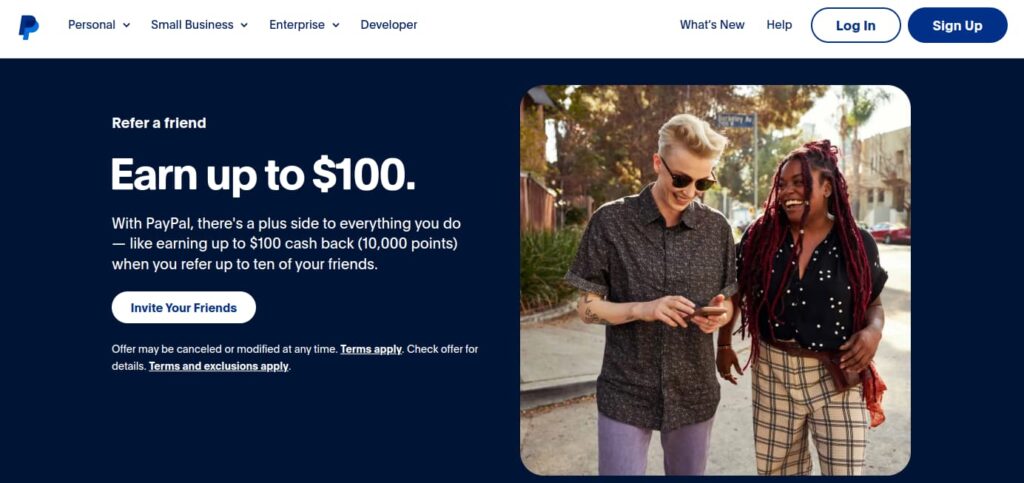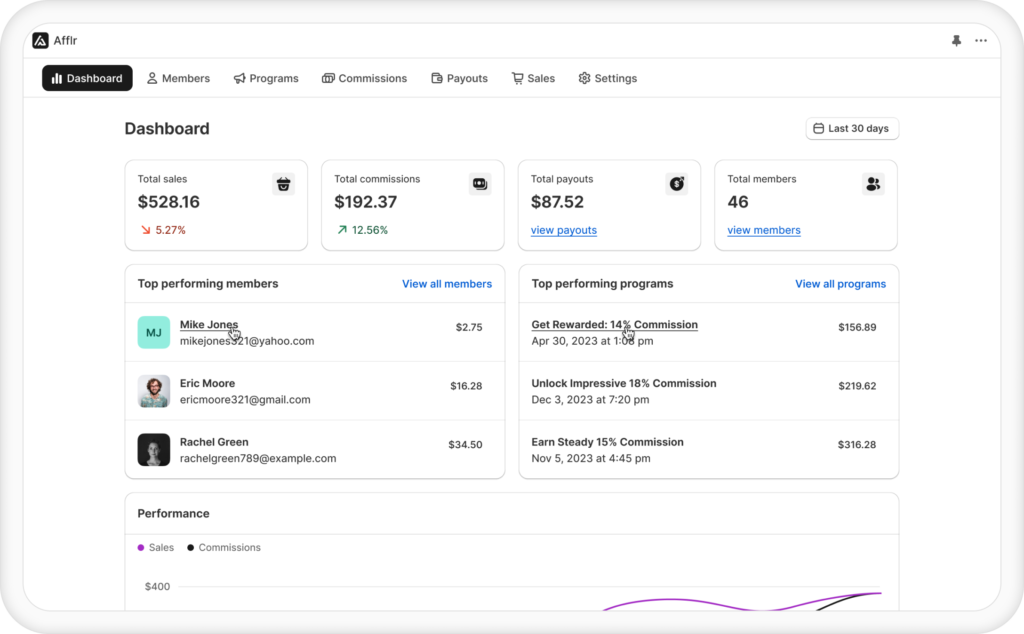Most customers’ first thought while purchasing is ‘Let me ask a friend’. Therefore, using Shopify referral marketing can help achieve high sales and conversions for your store.
92% of consumers around the world, according to a report by Nielsen, trust recommendations from their friends and family making a purchase decision.
Referral marketing in Shopify can establish rapport with new customers and attract additional ones simultaneously. Thus, you can use this to bring growth to your Shopify e-commerce business.
In this blog, you can learn the basics of Shopify referral marketing and how it can help your business reach heights.
Grow your customer base by using your existing customers to refer new ones for rewards with the help of Afflr.
What is Shopify referral marketing?
Shopify referral marketing is a way of promoting products or services through your existing customers by incentivizing them for successful sales.
While word of mouth marketing is an age-old practice, businesses now have streamlined this. Thus, you can achieve this by introducing incentives and utilizing technology.
Firstly, after a customer makes a purchase, they receive a personalized Shopify referral link or code. Secondly, they can share with their friends or family, along with a good word about the business. Finally, on successful sales, customers will receive rewards, and referrals will get discounts.
In Shopify affiliate marketing, affiliates are exclusively recruited to promote the business, while in referral marketing for Shopify, existing customers act as referral partners.
Types of Referral Marketing in Shopify
The types of referral marketing in Shopify are based on how you acquire referrals:
- Word-of-mouth referrals:
This straightforward approach happens when a customer shares about the product they enjoy with their social circle. Thus, it provides an organic way of performing Shopify referral marketing. Moreover, you can encourage customers to act as referral partners by offering attractive rewards. - Email-based referrals:
In this type, existing customers will receive emails with details about customer referral programs. You can include referral links, rewards, product descriptions, etc. Furthermore, you can share the advantages of being part of your referral programs. In addition, this can also serve as a friendly post-purchase engagement with the customer. - Incentive-based referrals:
This is a more structured form of Shopify referral marketing campaign. It encourages customers to refer by giving attractive affiliate commissions or reward points. Moreover, you can offer tiered commission by providing more rewards as they refer more customers. - Reviews referrals:
Reviews represent the most powerful form of referral. In this type, customers leave genuine feedback about the product. Thus, it can build trust among potential customers. Moreover, you can follow up with customers to rate and review their purchases without fail. Thus, it is a cost-effective way of gaining new customers.
9 Benefits of Referral Marketing for Shopify Stores
The benefits of referral marketing for Shopify stores that can maximize revenue and increase brand awareness are:
1. Reduced Customer Acquisition Cost
Referral marketing in Shopify doesn’t need ad space, materials, or an extensive team. Instead, you rely on your existing customers to refer new ones.
Following that, your Customer Acquisition Cost (CAC) and maintenance costs will reduce. Thus, you can expand your referral network exponentially for optimum Shopify referral fees.
2. Foster Brand Trust
In general, a customer will endorse the brands they use only if they genuinely appreciate them. Therefore, when someone we trust makes a recommendation, it automatically builds the brand’s credibility.
Moreover, trust in the referral partner will also extend to the brand itself. Consequently, this can be seen in many Shopify referral marketing reviews.
3. Enhance Customer Retention
The success of a referral program in Shopify makes customers more loyal to the business. Especially when rewarded with a customized Shopify referral code to share, customers feel appreciated and feel special.
Thus, using recommendation marketing in Shopify, you can deepen customers’ commitment to the brand. Consequently, they prolong their affiliation with the brand. Thus, you can increase customer retention.
4. Broaden Brand Reach
When your customer turns into a brand advocate, they will enthusiastically share the word with anyone willing to listen.
Thus, your brand will reach even individuals who may not have been on your advertising radar initially.
Moreover, you can reach a wider audience cost-effectively. Following this, you can easily acquire new customers and gain sales.
5. Build a Community
You can cultivate a community by empowering satisfied referral partners to share their positive experiences. Thus, this organic sharing creates a referral network of loyal supporters.
These loyal customers will contribute to the growth and build the authenticity of the community. Moreover, with repeated purchases by these loyal brand advocates, refer-a-friend marketing in Shopify will contribute to revenue growth.
In addition, you can also use influencer marketing in Shopify for global reach.
6. Increase ROI
Since the initial cost of setting up referral marketing for Shopify is low and incentives are awarded only after the purchase is made, the return on investment is high.
Its conversion rate surpasses that of other e-commerce affiliate marketing strategies. Nominal initial expenses reduce related risks, making it an attractive and efficient approach.
7. Amplify Customer Engagement
When your customer becomes your referral partner, the interaction goes beyond just traditional business-client relationships.
Furthermore, you can foster ongoing connections by consistently engaging customers. Thus, you can increase purchase frequency as customers stay closely connected.
8. Reach a More Targeted Audience
When employing traditional advertising, the Return on Advertising Spend (RoAS) tends to be moderate because the message may not always reach the intended target audience.
However, when customers advocate for your product through referral marketing, they can directly share their Shopify affiliate link with people they know will benefit. Thus, you can more easily reach a targeted audience.
9. Measure Customer Satisfaction Effectively
Referral programs work more effectively than any feedback form or ratings, which is evident from Shopify referral marketing reviews. Thus, when a customer makes more referrals, it’s evident that they feel satisfied with the product.
Moreover, by monitoring the analytics of your peer recommendation marketing, you can gain valuable product insights. Thus, this helps you optimize products and features.
Turn your customers into referral partners by integrating a Thank you page using Afflr
Strategies for Successful Referral Marketing in Shopify
The strategies for a successful referral marketing campaign in Shopify are:
1. Collect Product Reviews
Product reviews serve as a natural method to cultivate authentic trust in your product. Thus, encourage more customers to share their thoughts.
Furthermore, incorporate positive reviews and testimonials on your referral landing page, social media, newsletters, or promotional emails to endorse your Shopify referral marketing.
2. Effective Customer Incentives
Customers don’t inherently feel obligated to share positive feedback, even if they love a product. Thus, you must entice them with different types of commission models.
Furthermore, emphasize the benefits of referral sign-ups and offer discounts to referrals on their first purchases. As a result, you can increase the likelihood of a sale.
3. Use dedicated Shopify Referral Links
Assigning a unique referral link to each customer simplifies how you track and monitor their activities. In addition, you can also use affiliate tracking software.
As a result, you can identify top referral partners for your Shopify referral marketing and can offer them a bonus. This will motivate them to bring in more new customers.
4. Use Referral Marketing apps for Shopify
As the scope of referral marketing for Shopify stores expands, managing it manually becomes increasingly challenging. Therefore, use referral software or apps to automate various tasks and streamline operations.
A Shopify referral program app can help you smoothly create programs, customize commission, generate referral links, and automate affiliate payouts. In addition, you can also monitor performance and optimize results.
5. Create Flawless Communication
One crucial step often overlooked in managing referral marketing for Shopify is consistent communication. In fact, affiliate management is the most important step.
Therefore, develop a flowchart outlining various engagement strategies and follow it. This can include encouraging reviews, providing referral program details, sharing a Shopify referral code, and sending reminders.
6. Promote Your Shopify Referral Program
You have to promote your affiliate link on major channels to prevent it from getting lost amidst the crowd. Therefore, use various social media platforms, blogs, referral websites, and email marketing to effectively share information about your Shopify referral marketing.
Implementing these referral marketing strategies can effectively maintain customer engagement and attract new ones.
Case Study: Referral Marketing – PayPal
PayPal has had a solid referral program in place for years and they reached their first 1 million users with the help of this.
In his book “Zero to One,” PayPal co-founder Peter Thiel highlighted their strategic decision to employ referral marketing and shared how traditional advertising was deemed inefficient for the cost spent.

Initially, they offered new customers $10 for joining and an additional $10 for each referral partner. This approach led to an impressive average daily growth rate of 7 to 10 percent.
Currently, PayPal offers 1000 points if you refer a friend and they spend at least $5 within 30 days. Once you earn 10,000 points [10 referrals], you can redeem it for $100.
You can recreate similar success for your e-commerce business as well if you create a dynamic Shopify referral marketing strategy.
Shopify Referral Marketing Trends in 2024
Shopify Referral Marketing Trends in 2024 will edge toward a more data-driven approach where referral rewards will be tailored based on the individual referral partner.
Therefore, data and market analytics can also be used to build customized referral marketing strategies.
Referral programs must be optimized for mobiles as mobile users will double over the years.
Furthermore, implementing gamification elements such as leaderboards and progression stages can boost customer interest and engagement.
Following that, capitalize on the emergence of Artificial Intelligence (AI). Your referral programs in Shopify can use dynamic reward customization, predictive analysis, and fraud prevention.
Automate your referral marketing efforts using Afflr to reduce manual tasks and increase efficiency.
Conclusion
Adopting Shopify referral marketing for your e-commerce store will be sustainable in the long run. It helps not only retain existing customers but also expands the customer pool. This will ultimately increase brand awareness while maintaining a low initial marketing investment.
This blog will equip you with enough points to understand referral marketing in Shopify and frame the best strategies to implement it.
Further Reading
- How to create a Referral Program for your Shopify store?
- Ultimate Guide to Shopify Affiliate Marketing
- 11 Best Customer Referral Program Examples
- 10 Best Shopify Referral Apps in 2024
Frequently Asked Question
To set up referral marketing on Shopify, you have to first create a referral program. Create commission, generate referral links, and encourage customers to share them. Track referrals, analyze data, and optimize strategies for maximum effectiveness.
There is no Shopify referral fee imposed per se. It varies for each Shopify referral marketing campaign based on strategy. Referral fees are based on budget, industry standards, and the referral partner’s performance.
Yes, Shopify supports referrals through referral programs. Shopify owners can create their own programs to drive customer acquisition and boost sales.
Yes, Shopify can facilitate affiliate marketing using apps and integrations. You can create programs, recruit affiliates, share links, pay commissions, and monitor performance.
The three types of referrals are direct referrals, review referrals and social media referrals.
To create a referral list, identify satisfied customers who are likely to refer others. Utilize an automation tool for a referral program to record customer details and referral activities. Maintain communication with referral partners and provide incentives to encourage more referrals.
